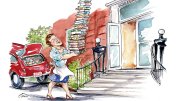1911
The College Library expects to be without money to buy new books for the next several months.
1926
Construction under way includes Straus Hall, the Fogg Art Museum, McKinlock Hall (a freshman residence fronting the Charles), and the Business School complex, a gift of George F. Baker.
***
The first movie theater in Cambridge is about to open across from the Yard.
1931
The masters of Adams, Kirkland, Leverett, Eliot, and Winthrop, the five new Houses, have joined the masters of Dunster and Lowell in apportioning a cross-section of current sophomores and juniors to each House for the coming year. The Bulletin reports that the proportion of public-school graduates is approximately the same in all the Houses, as is the distribution of students from different sections of the country.
***
The Corporation declines a Boston lawyer’s bequest of $25,000 for a lectureship designed to prove that the “modern feminist movement…[impairs] the family as a basis of civilization and its advance….”
1936
Harvard has established a laboratory at Glen Cove, Long Island, to study the origin, spread, and eradication of various plant diseases, especially Dutch elm disease.
1951
A survey of Bulletin readers finds that only one in four subscribers owns a television set.
***
President Conant urges passage of the Universal Military Service and Training Bill, partly because “the U.S. monopoly of the bomb has ended [and] Soviet allies have shown a readiness to gain their ends by force.”
1961
President-elect John F. Kennedy ’40, LL.D. ’56, is mobbed by enthusiastic Harvard students as he arrives to attend a meeting of the Board of Overseers.
1966
The Cambridge City Council approves Harvard’s request to construct, at its own expense, a six-lane underpass at the western end of Cambridge Street, north of the Yard.
***
Linda McVeigh ’67 becomes the first female managing editor of the Crimson.
1986
Backed by Alumni Against Apartheid, John Plotz ’69, Gay Seidman ’78 (the first woman president of the Crimson), and Kenneth Simmons ’54 collect enough signatures to run as petition candidates for the Board of Overseers, seeking to press Harvard to divest its holdings in companies doing business in South Africa.








